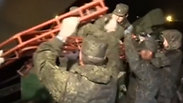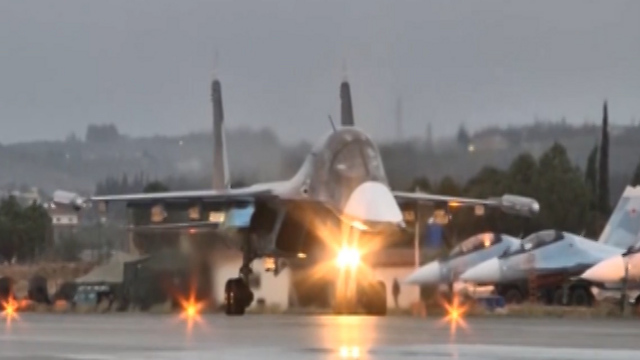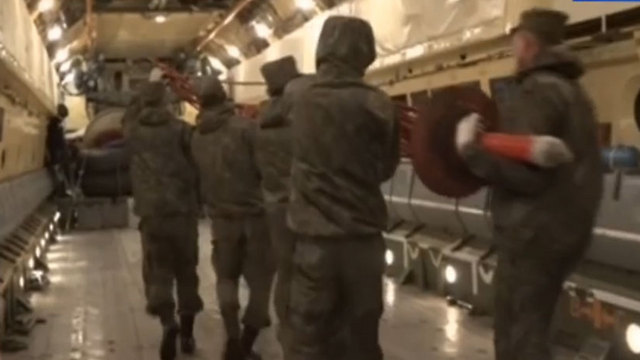
Russia seeks to reassure Israel over Syria pullout plan
While Moscow's deputy ambassador stresses his country will 'do everything so that Israel's national security interests are not harmed in the process,' IDF chief notes ramifications of Russian move aren't clear yet.
Israeli officials have privately said Russian forces sent in last year to help Syrian President Bashar Assad turn the tide against a now five-year-old rebellion also served to restrain his anti-Israeli allies - Iran and Lebanon's Hezbollah militia.
Israel was further helped by a hotline to the main Russian airbase at Hmeymim in Syria, which let it continue covert strikes to foil suspected Hezbollah or Iranian operations against it on Syrian turf without fear of accidentally clashing with Moscow.
Russia blindsided world powers on Monday by announcing that the main part of its forces in Syria would start to withdraw. Russia's deputy ambassador to Israel on Tuesday described the two countries' Syria coordination as remaining intact.
"We will try to ensure that this (Syria) crisis is resolved, and we will also do everything so that Israel's national security interests are not harmed in the process," the envoy, Alexey Drobinin, told Ynet, without elaborating.
He clarified that the Russian decision was made in an effort to promote negotiations between the sides. "Russia is sending a clear message to everyone involved in the Syria crisis - it's time to give political dialogue a chance, a change for an internal Syrian dialogue between the government and the different factions in the opposition," he said.
He also asserted that despite the fact Russian forces were leaving the war-ravaged country, their mission has not yet ended. "In order to defeat ISIS, the Nusra Front and other terror organizations, we have to put together an extensive international coalition with the US, European countries, and Arab nations. Russia cannot do the work for everyone," Drobinin stressed.
In separate remarks to Army Radio, Drobinin said Russia would maintain its military presence at Hmeymim airbase as well as a Mediterranean naval centre at Tartus.
"Israel is a neighboring country. It cannot be indifferent to what is happening in Syria. We take this into account, of course," he said. "We have an ongoing dialogue with the Israeli side on all levels - the military level and diplomatic level."
Zvi Magen, formerly Israel's ambassador to Moscow, told Ynet that "the discussion is not the withdrawal of troops, but the announcement that they will stop fighting, and that has a different type of meaning. Russia is probably not going anywhere, but it was more important for Putin to announce that he is now stopping the fighting."
'Israel had no prior knowledge about Russia withdrawal'
Israel has occasionally fired across the Golan Heights in response to spillover shelling or bombed advanced arms it suspected were to be transferred to Assad's Lebanese guerrilla allies, Hezbollah.
Past strikes in Syria, attributed by foreign sources to Israel, killed Syrian troops as well as Hezbollah fighters - though the exact number remains unclear.
President Reuven Rivlin was due to meet Russian President Vladimir Putin in Moscow on Wednesday. Drobinin said that would be "a very good opportunity to air opinions and provide answers for any questions the Israeli side might have".
Rivlin's role is largely ceremonial. His Russia trip was set before the Syrian withdrawal announcement.
Prime Minister Benjamin Netanyahu's government declined to be drawn on the issue.
But the IDF's chief of staff, Lt.-Gen. Gadi Eisenkot, told members of Knesset that Israel had no advance knowledge of Russia's pullback plan, whose impact he deemed hard to gauge.
"At this stage, humility and caution are required in trying to understand the vector in which the Syrian theatre will develop with the exit of Russian forces," Eisenkot told members of the Knesset's Foreign Affairs and Defense Committee in a closed-door briefing.
Eisenkot said that the Russian intervention had so far strengthened Assad's position in ceasefire talks with rebels.
Israel has voiced doubt about the truce prospects in Syria, which it anticipates will end up partitioned on sectarian lines.
Eisenkot predicted that the Russian withdrawal would be carried out gradually, but not fully, with Moscow maintaining two bases in Syria while thinning out overall troop deployments.
Attila Somfalvi contributed to this report.












